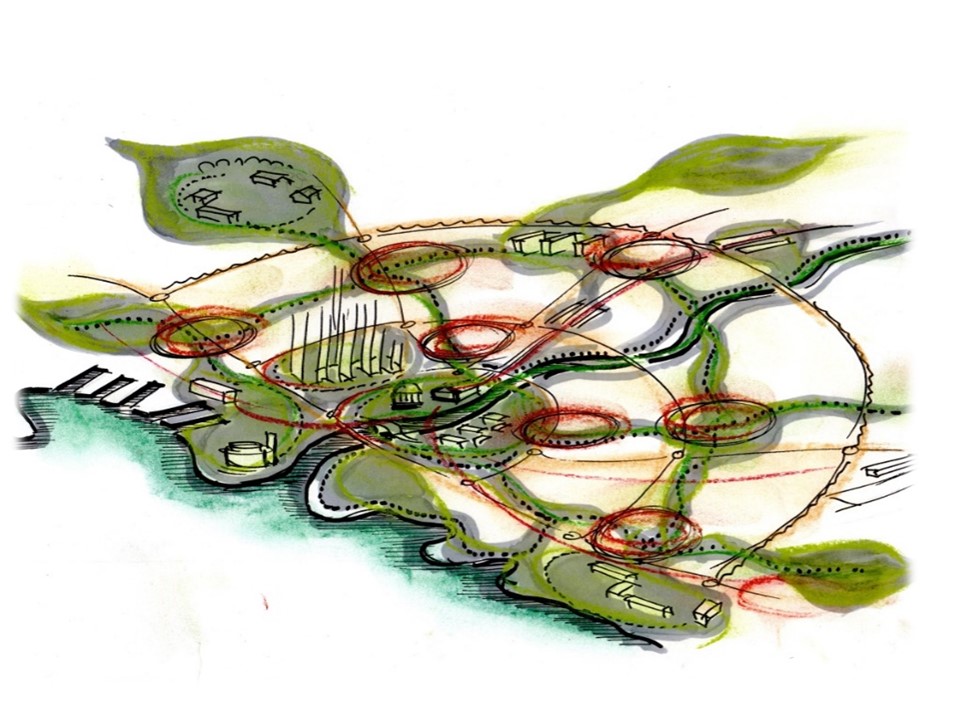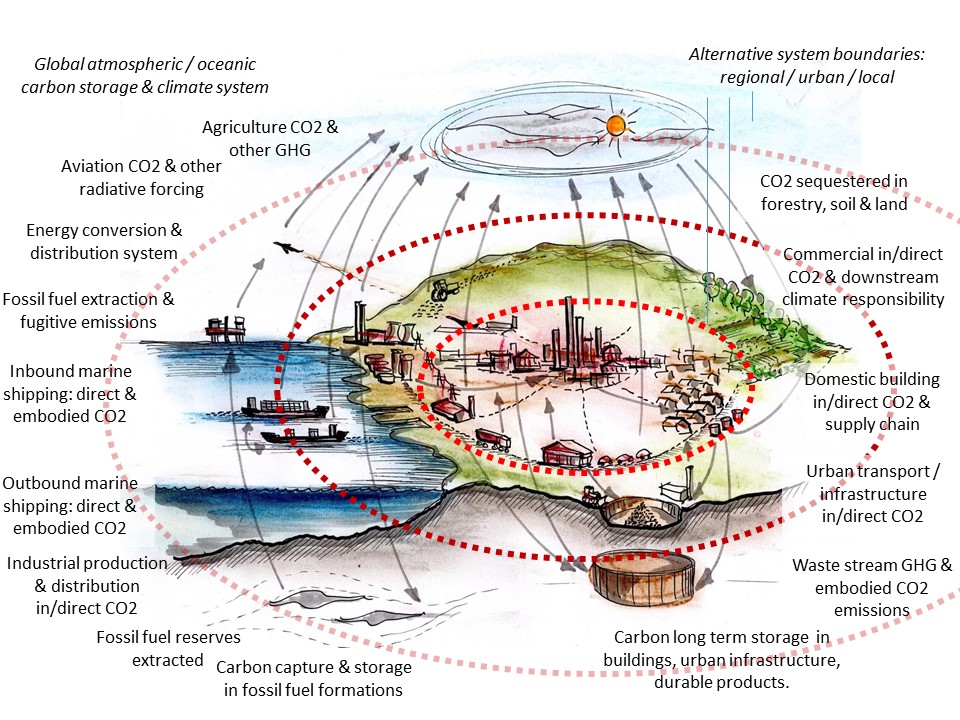Eco-wise theme
how to live in the Symbio-polis of the future??
Climate-proofing transitions and adaptations are not only economic and technical, but social, political, cultural, psychological – so how to bring all these parts together? How to mobilize all human resources for inclusive, job-creating, participative pathways? Few things are simple – cities for instance are taking new shapes and meanings, alongside economic development. If we talk about the ‘Net-zero pathways’ / ‘just transition’ / ‘Green New Deal’, are these mainly technical problems to be fixed – or – questioning the roots of neo-liberal capitalism?
Such questions are explored, with mappings and graphics, in the new book:
- Ravetz, J, (2023): Powering the city at the speed of thought: towards a ‘collective urban-energy intelligence’. In: Marcotullio, P.J, Sperling, J, Sarzynski, A, (Eds) Urban Energy and Climate: Changing Conditions and Future Prospects. World Scientific Publishing Company, Singapore. https://doi.org/10.1142/13194
Likewise on the ground, the Eco-Wise theme has now to include the new ‘peri-urban’ between and around cities, often in the line of flood, fire, storm and other climate hazards, and the newly emerging bio-regional thinking which tries to make sense of a fragmented landscape. And then we can explore the circular labyrinth of food-energy-water, and the question of resilience ‘to what and for who’? This broad spread of themes includes (with additional notes below) :
- Net-zero and Green New Deal 3.0
- Peri-urban & new forms of territorial development
- Climate change adaptation, risk & resilience
- Bio-regional, food-energy-water nexus & circular economy
There are also strong links to parallel programs
- – the Eco-war-3.0 agenda on physical / societal tipping points / conflicts
- – the Climate-wise agenda on the ‘big-bad-world’ effects of hijack & weaponization of climate action
Core partner: the Peri-cene project (www.peri-cene.net) , with University of Manchester, KTH Stockholm, Indian Institute of Technology Madras, and a Policy Lab of 21 cities with ICLEI and UN-Habitat.
For some eco-urban background see the Deeper City – 6-2 – Eco-urban-III
Current events & initiatives:
- ‘how to survive the 21st century’: July 21st 2023. – from the China-UK project on International resilient cities with UN Habitat, we bring new methods of risk / resilience analysis, to look beyond the city limits at whole urban / peri / rural systems.
- ‘Symbio-polis 3.0’ – 8-12 May – interactive mapping & design for urban / peri / rural regeneration, building the ‘collective bio-regional intelligence’ with students, academic & stakeholders, in collaboration with the University of Florence
- Eco-wars-3.0 – next session Sept 21st 2023 (tbc). we explore the interactions of climate tipping points with human tipping points, and invite participants for co-production of a ‘collective climatic intelligence’
Recent events
- Climate change / all change on the new frontiers – May 6th 2022 – travelling the ‘transformative adaptive pathways’ in the Peri-cene (‘peri-eco-urban anthropocene’).
- Net-zero / Green new deal-3.0- beyond COP26 – thinking ahead in disruption & opportunity – Feb 4th 2022
- Peri-cene 3.0 – 5th April 2022 – film screening & round table at CDMS Delhi
- (Peri-cene.net/ Policy Lab launch): Jan 29th 2022;
- ‘Net-zero / green new deal 3.0 – how can the circular economy transition be equal & inclusive? (with EC-JRC): March 26th 2021
- Bio-regional 3.0 : how to tame the global tiger? (with Univ Granada & UC San Diego): May 27th 2021
- (Peri-cene.net/ Policy Lab workshops): project sessions, also open to interested parties; (June 3, 8, 10, 15);
- Food 3.0 – how to link agro-ecology, super-food & urban livelihood? (with Camley St Land Trust, London): Sept 24th
- Resilience 3.0 – how to cope with 2, 3 or 4 degrees: Oct 14th 2021
Related events –
- Beyond COP26 – tools for a ‘collective climatic intelligence’ and The NERC Digital Solutions Hub: with Joe Ravetz, Manchester Urban Institute, and Prof Richard Kingston, Professor of Urban Planning. 10th Feb 2022: 1400. Register: https://bit.ly/3pJvmga
- From ‘here be dragons’ to a ‘collective spatial intelligence’ – prospects for mapping in a hyper connected world. Keynote for the Indian National Cartographic Association 2021 Conference – https://inca2020.org/conference – March 10th 2021
- International Conference on “Challenges of Disasters: Vulnerability, Adaptation and Resilience’: JNU, New Delhi: Valedictory Address by Joe Ravetz, March 3rd 2021- https://www.jmi.ac.in/bulletinboard/eventmodule/latest/detail/2461/26542
- 5th ICPEU (International Conference Planning in the Era of Uncertainty) “Rural-Urban Connectivity” – July 19 2021: keynote on: ‘The ‘anti-city-region’ – what it is and what to do?‘ http://johannes.lecture.ub.ac.id/2021/04/the-5th-international-conference-planning-in-the-era-of-uncertainty-the-5th-icpeu-2021/
- Keynote at the project conference – Revisioning peri-urban futures – Oct 2nd 2021
- Keynote at the International Forum on Urban-Rural Linkages (from the UN Habitat URL program) – Oct 19th 2021 – Songyang, China & online
- Interactive session at the international Bioregional Planning Conference – Oct 20th – Firenze Italy & online

Background notes
Net-zero 3.0 / ‘just transition’ / Green New Deal 3.0
The Net-Zero Carbon transition calls for more than a problem-fix – to make it work, technology change has to somehow fit with economic, social, political and cultural change. Either we leave all these combinations to chance, or, we look for some kind of collective net-zero intelligence which can put them together.
This program of open meetings / conversations explores around this topic with leading practitioners and analysts, each active on making transitions work on the ground. The result of this pilot 18 month program aims at a ‘prospectus’ for future funding (goal-led or responsive) – so that we can work through these issues in more depth.
One starting point is a systematic mapping of the many syndromes, gaps, barriers and systems dysfunctions, such as…
- social syndromes: distrust, blame, displacement, climate scepticism
- technical syndromes: uncertain performance, unseen side-effects & causal chains
- economic syndromes: investment hurdles, futurity problems, innovation valleys, skills gaps
- environmental syndromes: game-changing climate impacts & adaptation pressures
- policy syndromes: short termist, fragmented, elitist & compromised political systems
- cultural syndromes: myths & archetypes of capitalism, colonialism, patriarchy
The overall aim of the program is to realize a more effective Net-Zero 3.0 / Green New Deal 3.0 – to achieve a Low-Zero Carbon transition which is job-creating, inclusive, innovative, participative etc – which carries broad support – and which works… This Conversation explores 3 main questions for the collective green intelligence, i.e. the ‘3.0’ dimension –
- What would an collective net-zero intelligence look like on the ground? (local, regional, global south or north)
- Which pathways could mobilize this potential of a collective net-zero intelligence?
- What are the priorities for action, policy, investment, social innovation etc?
As of early 2023 we are open to ideas on funding, to help enlarge and follow through this vital program. Further details in the program working papers:
- Green new deal 3.0 – workshop report – 30-10-20
- Green new deal 3.0 – workshop report – 26-03-21
- Green new deal 3.0 – workshop notes – 04-02-22
- Green new deal 3.0 – post COP26 briefing – Jan 2022

